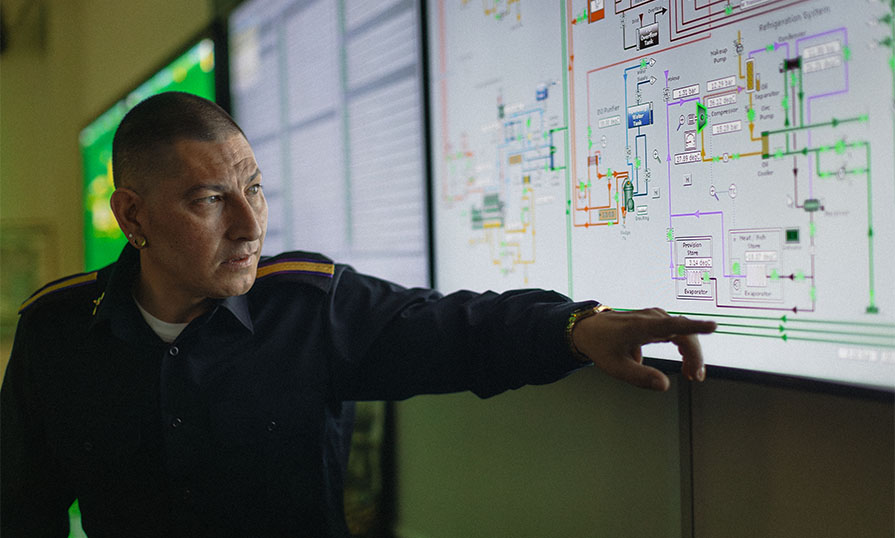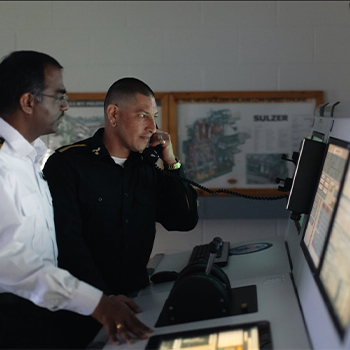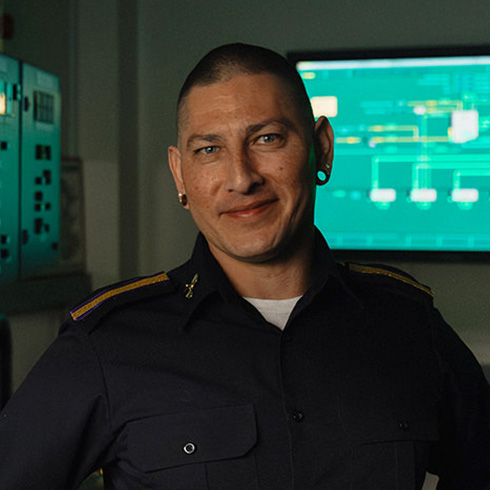Hard work, determination and a desire to succeed

Get to know Jay - Marine Engineering Management Technology graduate
Name: Jay Julian
Program: Marine Engineering Management Technology, 2023 graduate
NSCC Campus: Strait Area Campus, Nautical Institute

What does a marine engineer do?
A marine engineer maintains the systems on board the vessel to make sure they are working properly. When they start a shift on board a ship, the first thing they will do is walk around each floor and look at all the systems. They look at the temperature gauges and tank levels to make sure they are not too low or too high. Marine engineers deal with pipes and liquids that are hot so they have to be aware and can’t be complacent.
A marine engineer must be a well-rounded person who has a basic understanding of all disciplines. They must be able to think on the fly and troubleshoot any issues that arise.
How did you decide to take NSCC’s marine engineering program?
When I started at NSCC, it had been 13 years since I was in school. I spent 5 years in university after high school studying sociology. I had experienced hardship in my personal life, but I had the idea of being successful in my mind. I just wanted to be successful.
I had experience with lobster and snow crab fishing and enjoyed being out on the water. I had a taste of working on big ships. But fishing is seasonal work and I needed more to be able to provide for my son. I needed something that was more consistent, that paid more and where there was room for advancement.
I started in the marine mechanical one year certificate program at NSCC in 2018, and later transferred into the Marine Engineering Technology program. After finishing, I continued for another 1.5 years for the Marine Engineering Management Technology advanced diploma.
Ocean Dream Award - Funding for Indigenous Peoples and Women
"I received funding through the Ocean Dream Award which is available to Indigenous Peoples and women enrolled in a marine program. The bursary covers 90 percent of tuition costs as well as books and fees. Because I am Indigenous, I also received a living allowance which helped with transportation costs to and from school."
What are some of the things you learned as part of your training in the program?
In the first part of the Marine Engineering Technology program our shop class involved the use of a number of tools for the purpose of acquiring a basic understanding of trades such as electrical, welding, millwright and mechanical type work. We learned about the mechanical function of a ships engine and its components such as piston, piston rods and valves so that we are able to identify and troubleshoot any problems that may arise.
Further into the program, we were introduced to systems management such as Propulsion Plant Simulator, Variable Frequency Drive (VFD) simulator, and Proportional Integral Derivative (PID) simulator as part of the training. We also gained an in-depth understanding of the management tools involved with a ship and employees on a corporate management level.
How essential are physics and math in marine engineering?
To be successful in marine engineering, you need to be strong in physics and math. NSCC has tutoring support available. I had a tutor every year and they helped me through my classes that required physics and math.
What was the classroom environment like?
My classmates were really smart. A lot of them came straight from high school and they knew the basic stuff like the importance of doing homework, getting a tutor, and asking a teacher or classmate for help. They were good to me and when I was able to help someone, I would. We all knew how difficult the work was and we were willing to help one another.

You have to believe in yourself. Be positive and have self-confidence because we're all able to do anything we put our mind to. Put in the time, put in the effort and you will be successful, plain and simple. It’s all hard work and determination.
Tell me about your experience working with mentors and why positive mentorship is important?
A marine engineer must have 360 days at sea before they can challenge the certification exam with Transport Canada. One of the benefits of having to get so many sea days is that you get to work with different engineers on different ships. Some engineers are more willing to teach and have more patience than others. I want to be one of those engineers who are reliable and really know their stuff. I also want to be a person who is willing to teach and pass on my knowledge to up and coming engineers.
Where do you see yourself in 5 years from now?
I hope to be working on a ship and hopefully have my third- or second-class ticket by that time. I don't want to bounce around from company-to-company, ship-to-ship. I'm older now. I want to have a regular routine and just continually get better at my job and provide for my family.
